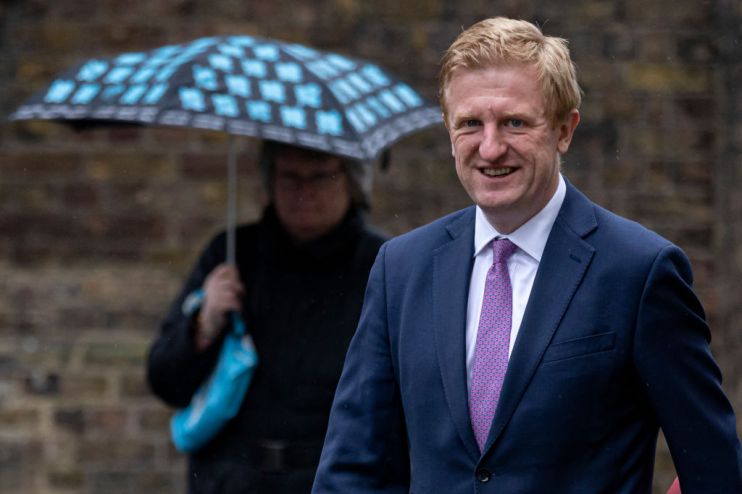Screenshot: Who’s invited to the UK’s summer of fun?

This week
**Media Moment of the Week: No 10’s power vacuum
**Who’s invited to the UK’s summer of fun?
**BT gets a broadband boost
Media Moment of the Week: No 10’s power vacuum
There are two main things to remember when unveiling your grand £2.6m briefing room to the world: make sure it doesn’t look like a Playmobil set and remember to tidy away your hoover.
Unfortunately, Downing Street slipped up on both these points this week, and found itself widely mocked for both the dodgy decor and a photobombing Henry Hoover.
Who’s invited to the UK’s summer of fun?
Oliver Dowden is not usually one to hog the limelight. The minister of fun has garnered a reputation for quietly getting on with the job — albeit it at a time when culture has been all but canned due to the pandemic. But Dowden this week stuck his head above the parapet, promising a “summer of fun” for the UK after what can only be described as a winter of discontent.
There’s a cautious plan for testing large crowds, starting with 20,000 fans piling into Wembley for the FA Cup final in May, while reports have emerged that the government is pledging support for a number of major events later this summer including the Euro 2020, the Lions tour and test cricket.
But (at the risk of gaining a reputation as a fun sponge), the reality of the matter is not quite so straightforward. The problem with post-pandemic fun — as anyone who’s tried to book a pub table in April will know — is it has to be organised. More specifically, when it comes to major events such as sports fixtures and music festivals, there needs to be insurance in place. After last year’s catastrophe, Covid-related insurance simply doesn’t exist, meaning thousands of events are unable to press ahead as planned. What’s more, despite repeated calls from the industry, as well as the launch of a similar scheme for the film and TV sector, the government has refused to underwrite events insurance itself.
This hesitancy has already claimed major victims, including Glastonbury, while a poll by the Association of Independent Festivals found 92.5 per cent of its members will be forced to cancel without insurance. DCMS committee chair Julian Knight this week said the government’s financial support was “utterly pointless” without an insurance scheme, warning the UK was in danger of having a “summer of none rather than a summer of fun”.
Safety must of course be a major consideration, and officials have previously dodged the issue by saying insurance must be the “final hurdle” to events going ahead. But with the lockdown roadmap in place and a full lifting of restrictions pencilled in for June, these uncertainties have surely been dispelled.
The issue with the summer of fun, then, is its strong whiff of favouritism. Reports that the government will support a handful of high-profile events at the expense of the wider industry have already sparked anger. A spokesperson for the Let Live Thrive campaign described this as “cherry-picking” and warned such a move would be “extremely counter-productive” and a “betrayal”.
Why should the Lions tour go ahead but not, for example, the Great North Run, which contributed £31m to the local economy and over £24m to charities in 2019? Why Euro 2020 but not Glastonbury? If the government really is to cherry-pick its favourites, there are huge political implications. Dowden’s assertion that he’s eager to get back to Wimbledon and Lord’s has hardly helped the situation.
In fairness, not all the responsibility lies with the culture secretary, and it may be chancellor Rishi Sunak who is actually the source of the blockage. After spending more than £400bn tackling the pandemic, everyone’s favourite money man is understandably keen to tighten the pursestrings. The government also insists that commitments on major sporting events such as the Euros had been made before the pandemic. But the fact remains that without a comprehensive insurance scheme in place for events this summer, only the chosen few will go ahead. If that’s the case, then it’s just Dowden’s summer of fun, and who knows if you’ll get the invite.
BT gets a broadband boost

You’d be forgiven for not getting excited about Ofcom’s Wholesale Fixed Telecoms Market Review. At a mind-numbing 1,600 pages long, it’s exactly the sort of regulatory drudgework that often gets overlooked (and would be anathema to Paul Dacre). But, for the telecoms industry at least, its importance cannot be overstated.
At the core of the review was a verdict on how much return BT can make from its £12bn investment in full-fibre broadband. The regulator said BT’s Openreach will be free from price caps on its wholesale offering for at least a decade. That’s less than the 20 years boss Philip Jansen was optimistically pushing for, but a good result nonetheless. The review also absolved the former telecoms monopoly of responsibility for keeping up its old copper network, and laid out measures to ensure competition in the market.
The outcome is an achievement for Ofcom, which was tasked with striking a balance between encouraging investment in the network, ensuring fair competition and guaranteeing fair prices for customers. This was no easy feat but, judging by the positive responses from BT, as well as rivals such as Talktalk that use its network, it seems to have reached a fair conclusion.
It also caps off a much-needed week of good news for BT which, alongside the UK’s other mobile networks, managed to secure a cut-price deal for EE in the latest 5G spectrum auction. The telecoms giant will be hoping these positive developments calm the waters after it was dragged into a messy row amid reports of a rift between Jansen and outgoing chairman Jan du Plessis.
But investor attention will now also be trained on the future of Openreach. Jansen last year said he was “open minded” about selling a stake in the infrastructure division — which has reportedly been valued at £20bn, a figure that eclipses BT’s current market value of £15bn — but insisted nothing would happen before Ofcom had published its review. Realistically, Jansen is unlikely to offload the division completely. However, with profits guaranteed for the next decade at least, now would seem the ideal time for BT to cash in on its lucrative infrastructure assets.
The algorithm recommends:
- In some positive despite the pandemic news, London attracted record levels of tech investment last year and is now home to 60 unicorns.
- The BBC is moving 400 jobs out of London as part of its efforts to stave off accusations of metropolitan bias. It’s a huge move and it remains to be seen whether staff are willing or able to up sticks.
- Uber has relented and is giving its drivers workers’ rights following the landmark Supreme Court ruling last month. Don’t be fooled by Uber’s glossy spin about a “better deal for drivers” though — it fought this ruling for five years…
Got a story? Drop me a line at james.warrington@cityam.com or on Twitter